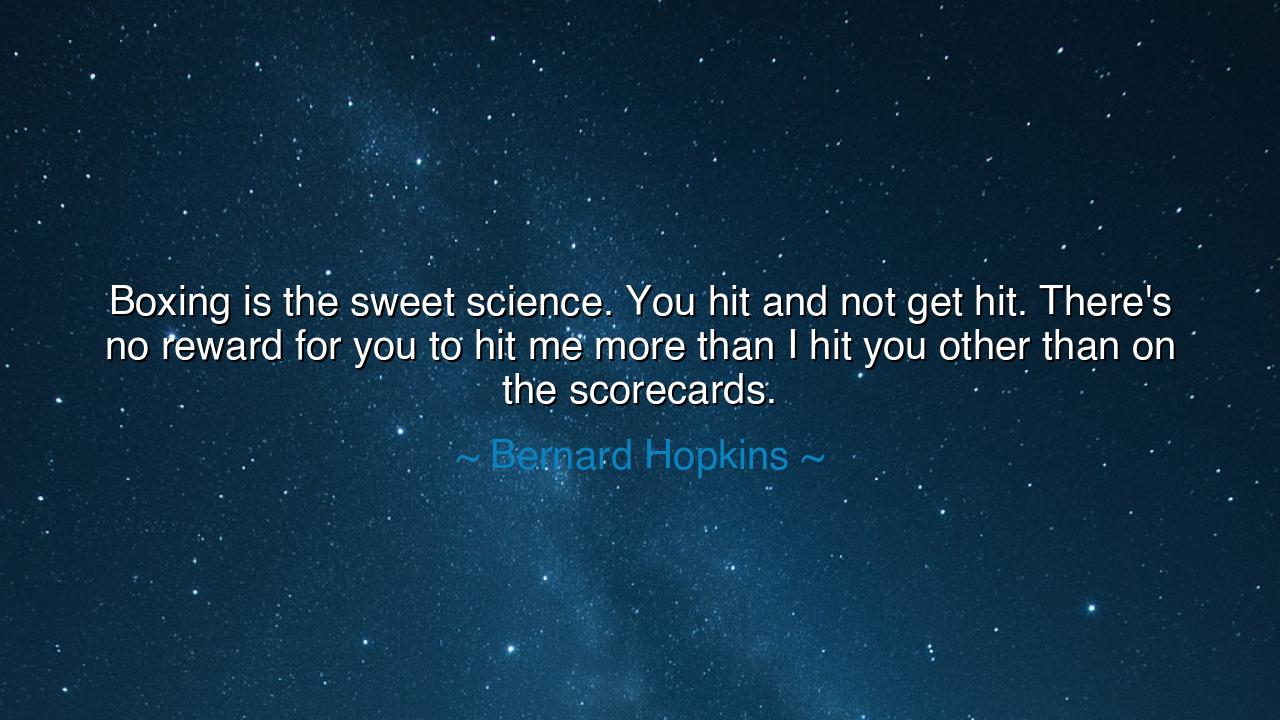
Boxing is the sweet science. You hit and not get hit. There's no
Boxing is the sweet science. You hit and not get hit. There's no reward for you to hit me more than I hit you other than on the scorecards.






Listen, O children of this earth, for there is a warrior’s wisdom in the words of the great Bernard Hopkins, a master of his craft who walked the path of boxing, a path as ancient as the very spirit of combat. "Boxing is the sweet science," he declares, "You hit and not get hit." This simple phrase contains the very essence of the noble art of boxing—an art that is not only about strength and fury, but about strategy, precision, and wisdom. It is a science, a delicate dance where the mind and body must move in harmony, a battle not just of muscle, but of the mind itself. To strike without being struck is the mark of a true warrior; it is not a victory of brute force alone, but of tactics, of intelligence in the midst of the storm.
Understand, O seeker of wisdom, that boxing is a battlefield where the strong are tested not only in their power to strike, but in their mastery of self. For the true lesson in Hopkins' words lies in this: There is no reward in merely delivering the most blows, nor in showing the world the fierceness of one’s spirit through pain and suffering. The reward is in control, in temperance, and in the understanding that to win is not to destroy, but to outwit. The warrior who strikes with intelligence, who dances with grace upon the canvas, emerges victorious, not through savage destruction, but through discipline and insight. For every blow delivered, there is an equal lesson in evasion, a reminder that to endure is not to absorb, but to evade.
Think of the ancient gladiators, who battled in the grand arenas of Rome. These men were not only trained in strength and swordplay; they were schooled in the art of self-preservation, for the true victory lay not in the number of strikes one delivered, but in the ability to survive, to outlast. Like the great fighters of old, the modern boxer must understand that boxing is not a contest of pain, but of mind. The fighter who knows how to absorb the blow of life without being consumed by it, who strikes with precision and retreat with wisdom, has learned the deepest lesson of all. It is the lesson of life itself—that we do not win by overwhelming the enemy, but by knowing when to strike and when to withdraw.
In the annals of history, there have been warriors who understood this well. One such figure is Sun Tzu, the ancient Chinese sage whose words shaped the very art of warfare. In his treatise The Art of War, he teaches that the supreme victory is to subdue the enemy without fighting, to win not through brute force but through strategy and subtlety. Boxing, as Hopkins speaks of it, is a reflection of this ancient wisdom. It is not about the clash of titans in a reckless storm of blows, but about outthinking the opponent, outmaneuvering them at every turn. The true boxer, like the true general, does not seek to absorb damage, but to avoid it, to take the path of least resistance, and to strike only when victory is assured.
But even as we speak of strategy and intelligence, we must not forget the strength of the body. For there is no wisdom without the strength to carry it out. Hopkins speaks not only of the mind but of the body’s role in this dance of combat. The great boxer, like the great warrior, must possess not just intelligence but discipline, not just knowledge but the physical stamina to execute the plan. It is this union of mind and body that makes the true boxer a hero, for he is a master of his own instrument, and through that mastery, he commands the battlefield with grace and poise.
Thus, O children of the future, the lesson that Bernard Hopkins imparts is this: True victory lies not in the raw display of strength, but in the control of self, in the mastery of both the mind and the body. The world around you is a battlefield, and like the boxer, you must navigate it with intelligence and grace. You must learn to strike when the time is right, to endure when necessary, and to retreat when needed. For in life, as in boxing, there is no reward in suffering without purpose, no honor in throwing oneself headlong into danger without thought. The true warrior is he who knows when to strike, when to retreat, and how to walk through life without being defeated by it.
Take these lessons into your life, O children of the earth. When faced with adversity, do not be driven by blind rage or impulse. Think, and strategize. Just as the boxer knows when to fight and when to evade, so must you know when to act and when to withdraw. Seek victory not through brute force, but through wisdom, and remember that in every battle—whether on the battlefield of the ring or the field of life—it is not the number of strikes delivered that determines your worth, but your ability to outsmart the challenges that come your way. To be a true champion is not merely to win, but to win with grace, strategy, and above all, wisdom.






AAdministratorAdministrator
Welcome, honored guests. Please leave a comment, we will respond soon